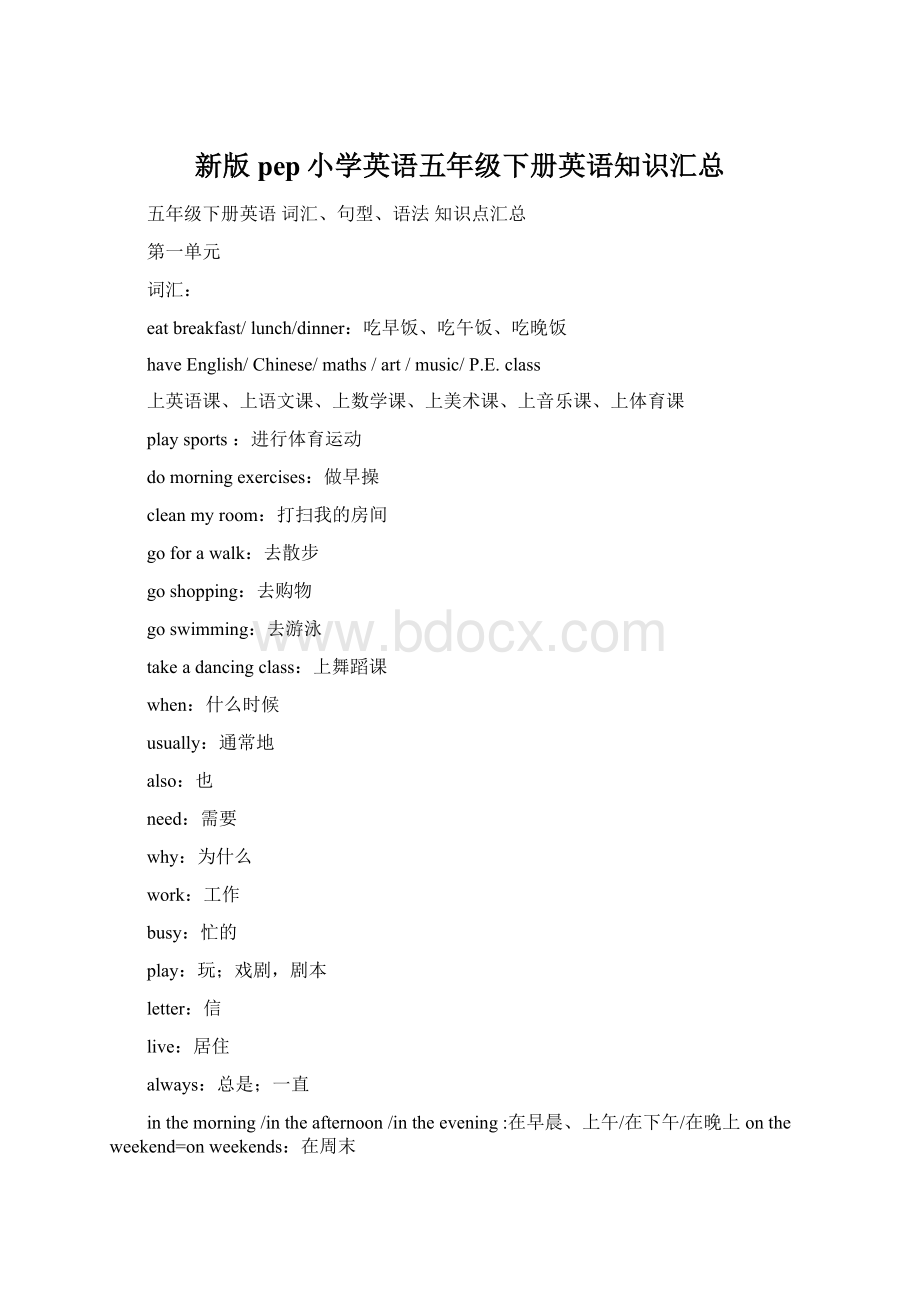新版pep小学英语五年级下册英语知识汇总Word格式文档下载.docx
《新版pep小学英语五年级下册英语知识汇总Word格式文档下载.docx》由会员分享,可在线阅读,更多相关《新版pep小学英语五年级下册英语知识汇总Word格式文档下载.docx(21页珍藏版)》请在冰豆网上搜索。

playthepipa:
玩琵琶
alotof=lotsof:
许多、大量
cookdinner:
做晚饭
dohomework:
做作业
watchTV:
看电视
hard-working:
努力工作的
everyday:
每天
inSpain/China/Canda:
在西班牙/在中国/在加拿大
Monday/Tuesday/Wednesday/Thursday/Friday/Saturday/Sunday:
星期一、星期二、星期三、星期四、星期五、星期六、星期日
句型:
1、Whendoyoudomorningexercises?
Ioftendomorningexercisesatseveno’clock.
2、Whatdoyoudoontheweekend?
IoftenwatchTVwithmyfatherontheweekend.
3、Youneedarobottohelpyou.
4、Thatsoundslikealotoffun.
5、Mikeisgoodatsports.
6、Heoftenwins.
语法:
一、介词的用法
on+星期/节日例如:
onSundays,onChildren’sDay
on+具体的某一天(月和日)例如:
onJanuaryfirstonApril4th
at+时间/地点例如:
atseveno’clock…atschool/athome….
另外还有固定结构:
atnoon:
在中午atnight:
在夜里
in+上午/下午/晚上例如:
inthemorning/intheafternoon/intheevening
in+月份/季节例如:
inAprilinsummer
in+地点例如:
inChina,inSpain
二、第三人称单数
当主语是第三人称单数时,动词要用第三人称单数形式,即一般情况下在动词原形后加-s
(一)、什么是第三人称单数
①人称代词he,she,it是第三人称单数。
如:
Shehaslunchattwelve.她十二点吃午餐。
②单个人名、地名或称呼作主语,是第三人称单数。
UncleWangoftenmakesapuppet.王叔叔经常做木偶。
(二)、动词原形变第三人称单数的规则
Ⅰ一般情况动词在词尾加“S”如:
read-reads
Ⅱ以辅音字母加“y”结尾的,要先将“y”变为“i”,然后在加“es”fly-flies
Ⅲ以“s,x,ch,sh”结尾的,在词尾加“es”
如:
teach-teacheswatch-watcheswash-washesgo-goes
Ⅳ以“o”结尾的动词,加“es”,如:
go-goesdo-does
Ⅴ特殊变化的:
have-has
(三)、用法
1)第三人称单数用了does后面就不用动词的“-s”形式了,而用动词原形.
Whatdoeshedoontheweekend?
2)变为一般疑问句,要在句首加"
do或者does”;
DoessheoftenwatchTV?
DoyouoftenwatchTV?
变为否定句,要在动词前面加"
donot或者doesnot"
可以简写为"
don'
t"
doesn’t
Johndoesnotdohomework.Idonotdohomework.
作文:
以MyDay为题,介绍自己“一天”内都干些什么事。
MyDay
TodayisMonday.Igetupat6:
00.Ieatbreakfastatabout6:
30.ThenIdomorningexercisesat7:
00a.m.Igotoschoolat7:
15.Ihavefourclassesinthemorning.Intheafternoon,Ioftenplaysports.Igohomeat3:
30.Idohomeworkafterschool.MyparentsandIwatchTVat8:
00intheevening.Igotobedat9:
00.Thisismyday.Ilikemyday.Canyoutellmeaboutyourday?
第二单元
spring:
春天
summer:
夏天
autumn(fall):
秋天
winter:
冬天
season:
季节
goonapicnic:
去野餐
pickapples:
摘苹果
makeasnowman:
堆雪人
去游泳
which:
哪一个
best:
最好的
goodjob:
做得好
because:
因为
pink:
粉色的
summervacation:
暑假wintervacation:
寒假
lovely:
可爱的(love的形容词)
leaf(单数)、leaves(复数):
树叶
paintapicture:
用颜料绘一幅画
allday:
全天,整天
everywhere:
到处、处处
Children’sDay:
儿童节
playinthesnow:
在雪里玩
plantflowers/trees:
种花、种树
eaticecream:
吃冰激凌
cold:
寒冷的
hot:
炎热的
warm:
暖和的
cool:
凉爽的
rainy:
多雨的
windy:
刮风的
sunny:
晴朗的
snowy:
下雪的
cloudy:
多云的
1、Whatistheweatherlikeinwinter?
2、Doyoulikethemusic?
Yes,Ido.No,Idon’t.
3、Whichseasondoyoulikebest?
Ilikesummerbest.Icangoswimmingeveryday.
4、Whydoyoulikesummer?
BecauseIlikesummervacation.
5、Ican’t(=cannot)swim.
6、Thereislotsofsnow.(注意Therebe句型用法)
7、Howaboutyou?
=Whataboutyou?
8、Iwanttopaintapicture.
9、IlikewinterbecauseIcanplayinthesnow.
IlikesummerbestbecauseofChildren’sDay.
10、WhichseasondoesAmylike?
特殊疑问词
1、When:
什么时候(问时间)
Whendoyougetup?
2、Where:
哪里(问地点)
Whereisyourruler?
3、Which:
哪一个
Whichseasondoyoulikebest?
4、Why:
为什么(问原因)
Whydoyoulikespring?
Because…
5、What:
什么
WhatdoyouoftendoonMondays?
What’sthis?
Whattimeisit?
Whatcolourisit?
What’stheweatherliketoday?
What’shelike?
What’syourname?
Whatwouldyoulike?
Whatcanyoudo?
6、Who:
谁(问人物)
Who’syourartteacher?
7、Howmany:
多少(问数量)
Howmanyroomsarethereinyourschool?
1、写写最喜欢的季节
MyFavouriteSeason
Myfavouriteseasonisspring.Springisagreenseason.Inspring,it’salwayssunnyandwarm.Icanplanttreesandflowers.Ioftengoonapicnicwithmyfriends.Ilikespringverymuch.
2、介绍四季:
TheFourseasons
Therearefourseasonsinayear.It’swarmandsunnyinspring.Therearemanyflowerseverywhere.Icangoonapicnic.Insummer,it’shotandrainy.Icanswim.Infall,it’scoolandwindy.Icanpickapples.Inwinter,it’scoldandsnowy.Icanmakeasnowman.
Ilikesummerbest.BecauseIcanswim.Canyoutellmewhichseasondoyoulikebest?
第三单元
January(Jan.):
一月
Feburuary(Feb.):
二月
March(Mar.):
三月
April(Apr.):
四月
May:
五月
June(Jun.):
六月
July(Jul.):
七月
August(Aug.):
八月
September(Sept.):
九月
October(Oct.):
十月
November(Nov.):
十一月
December(Dec.):
十二月
注意:
1、月份的首字母一定要大写。
2、May没有缩写形式,September的缩写形式是“Sept.”,其他月份单词的缩写形式都是有单词的前三个字母加“·
”构成。
3、月份的缩写形式不用在句子中,只能单独使用。
4、表示“在几月”时,要在月份单词前面加介词in,但在几月几日用on。
NewYear’sDay(inJanuary):
元旦
TreePlantingDay(inMarch):
植树节
Easter:
复活节
MayDay(inMay):
劳动节
Mother’sDay(inMay):
母亲节
Children’sDay(inJune):
Father’sDay(inJune):
父亲节
DragonBoatFestvial(inJune):
端午节
Teachers’Day(inSeptember):
教师节
Mid-AutumnDay(inSeptemberorOctober):
中秋节
China’sNationalDay(inOctober):
国庆节
AmericanThanksgivingDay(inNovember):
美国感恩节
Christmas(inDecember):
圣诞节
theGreatWall:
长城
lookfor:
寻找
playgames:
玩游戏
sendanemail:
发送一封电子邮件
makawish:
许愿
eatmooncakes:
吃月饼
eatabirthdaycake:
吃一块生日蛋糕
makeacard:
制作一张卡片
writealetter:
写一封信
tellastory:
讲一个故事
afew:
一些
sportsmeet:
运动会
schooltrip:
学校旅行
Chinese/English/mathstest:
语文、英语、数学竞赛
singingcontest:
歌唱比赛
holiday:
假日、节日
summervacation/wintervacation:
暑假、寒假
year:
年
nextweek:
下周
1、问答某个活动或节日在几月份的句型及回答。
句型结构:
问:
Whenis+活动或节日名称?
答:
It’sin+月份。
例如:
WhenisTreePlantingDay?
It’sinMay.
2、询问别人将要做什么的句型及回答。
Whatwillyoudo+其他?
Iwill·
·
=I’ll·
WhatwillyoudoforyourmotheronMother’sDay?
母亲节你将为你妈妈做什么?
答:
I’llcookformymother.
3、表达“我们将要·
”的句型。
We’ll=Wewill后面+动词原形,这是一个一般将来时的句子,表示将来某个时间要发生的动作或事情。
We’llhaveaschooltrip.(我们将有一次学校旅行。
)
We’llhaveasingingcontest.(我们将有一次歌咏比赛。
We’lltakeadancingclass.(我们将要上一节舞蹈课。
4、Wehaveafewfunthingsinspring.
5、That’sverykindofyou.
6、IsthesingingcontestinMay?
Yes,itis.
No,itisn’t.
7、What’syourfavouriteseason?
Autumnismyfavouriteseason.
第四单元
AprilFool’sDay(onApril1st):
愚人节
makenoises:
制造噪音
hungry:
饿了(反义词---full饱了)
walk:
行走
bothof:
两者都...
fur:
软毛
基数词与序数词:
一、基数词:
用来数数的词,例如:
一、二....
基数词:
1-10
1
2
3
4
5
6
7
8
9
10
one
two
three
four
five
six
seven
eight
nine
ten
11-19
11
12
13
14
15
16
17
18
19
eleven
twelve
thirteen
fourteen
fifteen
sixteen
seventeen
eighteen
nineteen
整十的数
20
30
40
50
60
70
80
90
twenty
thirty
forty
fifty
sixty
seventy
eighty
ninety
二、序数词:
用来表示数目顺序的词用序数词,例如:
第一、第二...
序数词:
第一到第十
第一
第二
第三
第四
第五
第六
第七
第八
第九
第十
序数词
first
second
third
fourth
fifth
sixth
seventh
eighth
ninth
tenth
缩写
1st
2nd
3rd
4th
5th
6th
7th
8th
9th
10th
总结:
序数词的缩写形式:
数字+序数词词尾两个字母,例如:
1st,2nd,3rd,4th
第十一
第十二
第十三
....
第二十
第二十一
...
第三十
eleventh
twelfth
thirteenth
twentieth
twenty-first
thirtieth
口诀记忆:
基变序有规律,结尾加上th;
一二三特殊记,结尾各是st,nd,rd;
八加h,九去e,f来把ve替;
y改为ie,结尾仍有th;
若是遇到几十几,只变个位就可以。
三、“基数词”变成“序数词”的变化规则:
1)序数词1-19:
除第一(first),第二(second),第三(third),第五(fifth),
第八(eighth),第九(ninth),第十二(twelfth)变化不规则外,
其余均由在基数词后加上th
2)十位整数(共八个数)的序数词的构成方法,是将十位整数基数词的词尾
-y变成i再加–eth.
twenty——twentieththirty—thirtieth
3)几十几的序数词,只是把个位数变成相应的序数词,十位数不变。
twenty-one—twenty-firstthirty-two—thirty-second
四、基数词和序数词的应用:
1、基数词:
一、…
序数词:
第一、…
2、基数词:
用于数量、时间等
Therearefivepencils.
It’sfouro’clock.
用于日期。
It’sonJanuaryfirst.
1、询问别人具体日期的句型及回答。
Whenis+节日/活动?
(·
是哪天?
It’son+月份+序数词。
Whenisthesportsmeet?
It’sonApril4th.
2、询问生日的句型及回答
Whenis+某人的+birthday?
(·
生日是哪天?
It’son+具体的日期。
-Whenisyourbirthday?
-MybirthdayisonApril1st.
-WhenisMissWhite’sbirthday?
-It’sonJuly1st.
3、Wecanhaveabirthdaypartyforbothofyou.
4、Mycathastwonewkittens.
5、WhenisMother’sDay?
It’sonthesecondSundayinMay.
节日日期:
1.NewYear’sDayisonJanuary1st.
2.TreePlantingDayisonMarch12th.
3.Woman’sDayisonMarch8th.
4.AprilFool’sDayisonApril1st.
5.MayDayisonMay1st.
6.Chilren’sDayisonJune1st.
7.Teachers’DayisonSeptember10th.
8.China’sNationalDayisonOctober1st.
9.ChristmasisonDecember25th.
第五单元
一、人称代词
表示“我”、“你”、“他”、“她”、“它”、“我们”、“你们”、“他们”的词,叫做人称代词。
人称代词有人称、数和格的变化,见下表:
人称
单数
复数
主格
宾格
第一人称
I
me
we
us
第二人称
you
第三人称
he
him
they
them
she
her
it
人称代词主格:
作主语,表示谁怎么样了、干什么了。
一般情况下用于句首。
Iamateacher.Youarestudent.Heisastudent,too.
We/You/Theyarestudents.
人称代词宾格:
作宾语,表示动作行为的对象。
一般情况下用于句中或句尾。
Giveittome.Let’sgo.(let’s=letus)
二、物主代词
表示所有关系的代词叫做物主代词。
物主代词分形容词性物主代词和名词性物主代词二种,其人称和数的变化见下表:
数
类别
形容词性物主代词
my
your
his
its
our
their
名词性物主代词
mine
yours
hers
ours
theirs
汉语
我的
你的
他的
她的
它的
我们的
你们的
他(她、它)们的
名词性物主代词=形容词性物主代词(my/your/his/her/...)+名词
名词性物主代词一般用于句尾。
形容词性物主代词一般用语句首、句中。
Lookatmypicture.
—Isth